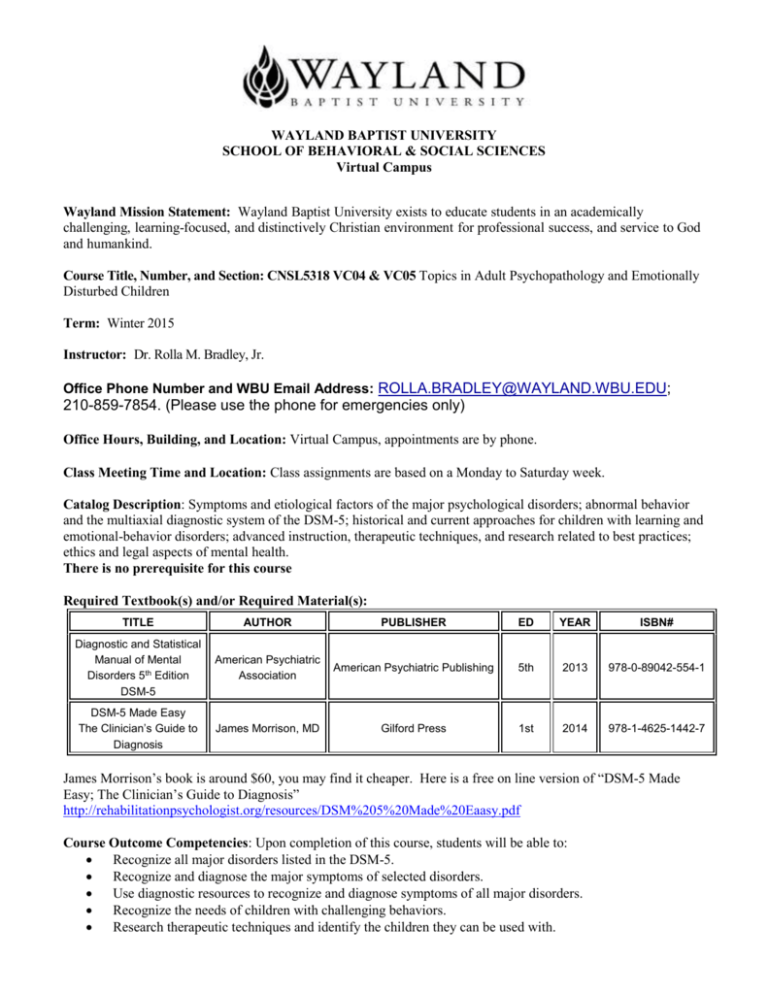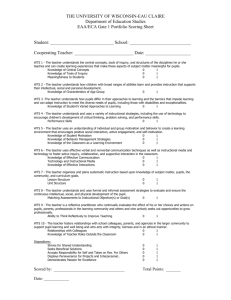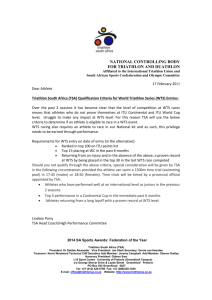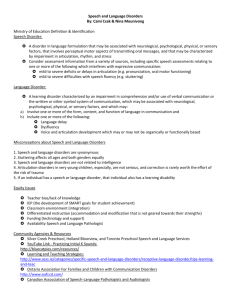topics adult psycopathology - Wayland Baptist University
advertisement

WAYLAND BAPTIST UNIVERSITY SCHOOL OF BEHAVIORAL & SOCIAL SCIENCES Virtual Campus Wayland Mission Statement: Wayland Baptist University exists to educate students in an academically challenging, learning-focused, and distinctively Christian environment for professional success, and service to God and humankind. Course Title, Number, and Section: CNSL5318 VC04 & VC05 Topics in Adult Psychopathology and Emotionally Disturbed Children Term: Winter 2015 Instructor: Dr. Rolla M. Bradley, Jr. Office Phone Number and WBU Email Address: ROLLA.BRADLEY@WAYLAND.WBU.EDU; 210-859-7854. (Please use the phone for emergencies only) Office Hours, Building, and Location: Virtual Campus, appointments are by phone. Class Meeting Time and Location: Class assignments are based on a Monday to Saturday week. Catalog Description: Symptoms and etiological factors of the major psychological disorders; abnormal behavior and the multiaxial diagnostic system of the DSM-5; historical and current approaches for children with learning and emotional-behavior disorders; advanced instruction, therapeutic techniques, and research related to best practices; ethics and legal aspects of mental health. There is no prerequisite for this course Required Textbook(s) and/or Required Material(s): TITLE AUTHOR PUBLISHER ED YEAR ISBN# Diagnostic and Statistical Manual of Mental Disorders 5th Edition DSM-5 American Psychiatric Association American Psychiatric Publishing 5th 2013 978-0-89042-554-1 DSM-5 Made Easy The Clinician’s Guide to Diagnosis James Morrison, MD Gilford Press 1st 2014 978-1-4625-1442-7 James Morrison’s book is around $60, you may find it cheaper. Here is a free on line version of “DSM-5 Made Easy; The Clinician’s Guide to Diagnosis” http://rehabilitationpsychologist.org/resources/DSM%205%20Made%20Eaasy.pdf Course Outcome Competencies: Upon completion of this course, students will be able to: Recognize all major disorders listed in the DSM-5. Recognize and diagnose the major symptoms of selected disorders. Use diagnostic resources to recognize and diagnose symptoms of all major disorders. Recognize the needs of children with challenging behaviors. Research therapeutic techniques and identify the children they can be used with. Identify the historical perspectives of behavior management. Be familiar with and evaluate criteria and treatments of all major disorders listed in the DSM-5. Understand & discuss the various legal and ethical issues involved in the diagnosis of mental illness. Attendance Requirements: Virtual Campus Students are expected to participate in all required instructional activities in their courses. Online courses are no different in this regard; however, participation must be defined in a different manner. Student “attendance” in an online course is defined as active participation in the course as described in the course syllabus. Instructors in online courses are responsible for providing students with clear instructions for how they are required to participate in the course. Additionally, instructors are responsible for incorporating specific instructional activities within their course and will, at a minimum, have weekly mechanisms for documenting student participation. These mechanisms may include, but are not limited to, participating in a weekly discussion board, submitting/completing assignments in Blackboard, or communicating with the instructor. Students aware of necessary absences must inform the professor with as much advance notice as possible in order to make appropriate arrangements. Any student absent 25 percent or more of the online course, i.e., non-participatory during 3 or more weeks of an 11 week term, may receive an F for that course. Instructors may also file a Report of Unsatisfactory Progress for students with excessive non-participation. Any student who has not actively participated in an online class prior to the census date for any given term is considered a “no-show” and will be administratively withdrawn from the class without record. To be counted as actively participating, it is not sufficient to log in and view the course. The student must be submitting work as described in the course syllabus. Additional attendance and participation policies for each course, as defined by the instructor in the course syllabus, are considered a part of the university’s attendance policy. Course Requirements and Grading Criteria: This course works off of a cumulative point system. You will know your grade by the total points accumulated. Points will be deducted for late work. Computer technology issues are not an excuse for late or missing work. Be sure you know how to submit work prior to the due date. Late work is measured by the time posted Blackboard. All written work will be submitted following the Publication Manual of the American Psychological Association 6th Edition. This course works on a 6-day week. Assignments are due by Saturday at midnight, central time. Wayland is a Christian University, as such, Sunday will be considered a day of rest. The University has a standard grade scale: A = 90-100, B = 80-89, C = 70-79, D = 60-69, F= below 60, W = Withdrawal, WP = withdrew passing, WF = withdrew failing, I = incomplete. An incomplete may be given within the last two weeks of a long term or within the last two days of a micro term to a student who is passing, but has not completed a term paper, examination, or other required work for reasons beyond the student’s control. A grade of “incomplete” is changed if the work required is completed prior to the last day of the next long (10 to 15 weeks) term, unless the instructor designates an earlier date for completion. If the work is not completed by the appropriate date, the I is converted to an F. A – 2400-2160 B – 2159-1920 C – 1919-1680 D – 1679-1440 F – 1439 > Instructor's policy on Academic Dishonesty: The primary concern in the context of Academic Dishonesty is that of plagiarism. I take plagiarism very seriously. Be sure to always give credit when you use another person’s ideas or material. Failure to do this can result in failing and possible removal from the Master of Counseling program. Submitting your work from another course without giving yourself credit is plagiarism. Do not resubmit papers from another course. Student grade appeals: Students shall have protection through orderly procedures against prejudices or capricious academic evaluation. A student who believes that he or she has not been held to realistic academic standards, just evaluation procedures, or appropriate grading, may appeal the final grade given in the course by using the student grade appeal process described in the Academic Catalog. Appeals may not be made for advanced placement examinations or course bypass examinations. Appeals limited to the final course grade, which may be upheld, raised, or lowered at any stage of the appeal process. Any recommendation to lower a course grade must be submitted through the Executive Vice President/Provost to the Faculty Assembly Grade Appeals Committee for review and approval. The Faculty Assembly Grade Appeals Committee may instruct that the course grade be upheld, raised, or lowered to a more proper evaluation. Assignments: Assignments are only accepted via Blackboard. I do not accept assignment via email. If you have difficulty uploading an assignment contact the Help Desk first. If you need to call or text, do not do so prior to 8:00 am or after 10:00 pm or on Sundays. Points ASSIGNMENT EXPLANATION 1. Reading This course is reading intensive. The weekly assignment requires reading of up to 100 pages a week. The intent is an intensive perusal of the material. Know the basics and where to find the information. I do not expect you to read word for word, but you are responsible for all that is in the reading. Make friends with the DSM-5. Mark it up, put in page markers. In your practice you will use it often. 2. Discussion Board (This will count for attendance. Discussion Board prompts will not be reopened for late submissions.) There will be discussion boards--two the first week and then one for each week. Each week requires a post and response to another students post. Students will be required to participate in each with at least 250 word initial post and a 100 word academic response to one other student’s initial post. (The posts are to be a reflection on the material for the week, do not write a report, do not regurgitate the material. Interact with the material, what do you think? This is where your opinion is appropriate, not in papers submitted.) 3. DSM-5 Pre-test This is a completion grade. It is only a measure of where we are starting. You receive full credit for completion of the assessment. 100 4. Weekly topic submission Each week you will be asked to complete a “Weekly Topic Submission” on a specific topic in the reading. The submission is to follow a specific format: (One to two pages, APA formatting, references given and double spaced type, 12 point font.) Be sure to have your name, the assigned topic with the DSM-5 and the ICD 10 codes. 1200 (100 points per week) These are due each Saturday by midnight. (Blackboard time) What do you know before you read about this topic? What do you think about this topic? Do the required reading. What did you discover that is new to you? What did you think you knew that was incorrect? 600 (50 points per week, 25 per post) 5 . Diagnostic Paper This is a major paper; it is at the end of the semester and 500 serves as a demonstration of your understanding of differential diagnosis. Your topic must come from the DSM-5. It must be clinical and not your opinion or values. You topic must be approved by Dr. Bradley prior to the Christmas Break. The Rubric for grading is: Point 1—APA format and writing skill. Levels of Achievement: Minimal Expectation 100 (20%) points Limited to DSM-5 or minimal research (fewer than 3 outside resources). Poor spelling (more than 3 misspelled words) and grammar Acceptable Expectation 200 (40%) points DSM-5 and some additional research (3 to 5 outside resources). Good spelling (less than 3 misspelled words) and grammar Excellent Expectation 300 (60%) points DSM-5 and evidence of extensive research (5 plus outside resources. No misspelled words or grammar errors Point 2—Clear presentation of diagnosis with a story to show understanding. (The story should be original, but if copied make sure you add to it and do not just use someone else’s work. If you use someone else’s story, be sure to give credit.) Levels of Achievement: Minimal Expectation 50 (10%) points Presentation of a simple story explaining the disorder. Acceptable Expectation 75 (15%) points Presentation of a complete story explaining the disorder. Excellent Expectation 100 (20%) points Presentation of an interesting and well written story with details beyond the disorder. Point 3—Clinical treatment, what would you do in therapy? Levels of Achievement: Minimal Expectation 50 (10%) points Clear presentation of a theory. Acceptable Expectation 75 (15%) points Clear presentation of a theory with an explanation of why that theory was chosen. Excellent Expectation 100 (20%) points Clear presentation of a theory with an explanation of why that theory was chosen. Includes deficits and strengths of the theory for this disorder. COURSE OUTLINE AND DUE DATES Week # / Date Content Discussions – Page numbers are a close approximation, read the sections listed. Assignments Due 1 November 9 Review of Syllabus Weekly Topic Submission (WTS) – Organization of the DSM-5 2 November 16 Read Section 1: DSM-5 Basics Morrison Chapter 1 WTS – Basic Assumptions of the DSM - 5 3 November 23 Happy Thanksgiving – Read ahead No Assignments 4 November 30 Read Section II: Pages 31-154 Neurodevelopmental Disorders Schizophrenia Spectrum and other Psychotic Disorders Bipolar and Related Disorders Morrison Chapter 2 WTS - Schizophrenia Read Section II: Pages 155-234 Depressive Disorders Anxiety Disorders Morrison Chapters 3 & 4 WTS – Panic Disorder Read Section II: Pages 235-308 Obsessive-Compulsive and Related Disorders Trauma- and Stressor-Related Disorders Morrison Chapters 5, 6 & 7 WTS – Reactive Attachment Disorder Christmas Break – I encourage you to catch up and to read ahead. Read Section II: Pages 309-360 Somatic Symptom and Related Disorders Feeding and Eating Disorders Elimination Disorders Morrison Chapters 8, 9 & 10 WTS – Factitious Disorder Read Section II: Pages 361-450 Sleep-Wake Disorders Sexual Dysfunctions Morrison Chapters 11& 12 WTS – Female Sexual Interest/Arousal Disorder Read Section II: Pages 451-480 Gender Dysphoria Disruptive, Impulse-Control, and Conduct Disorders Morrison Chapters 13 & 14 WTS – Pyromania Read Section II: Pages 481-590 Substance-Related and Addictive Disorders Morrison Chapter 15 Discussion Board WTS 5 December 7 6 December 14 December 21January 3 7 January 4 8 January 11 9 January 18 10 January 25 Pre-test and Discussion Board 1 & Introduction WTS Discussion Board WTS Discussion Board WTS Discussion Board WTS No Assignment Discussion Board WTS Discussion Board WTS Discussion Board WTS Discussion Board WTS 11 February 1 12 February 8 WTS – Cannabis Intoxication Read Section II: Pages 591-706 Neurocognitive Disorders Personality Disorders Paraphilic Disorders Morrison Chapters 16, 17 & 18 WTS – Avoidant Personality Disorder Read Section II: Pages 707-782 Other Mental Disorders Medication-Induced Movement Disorders and other Adverse Effective of Medication Morrison Chapter 19 WTS – Nonadherence to Medical Treatment Additional Information: http://catalog.wbu.edu Discussion Board Diagnostic Paper WTS Discussion Board WTS







